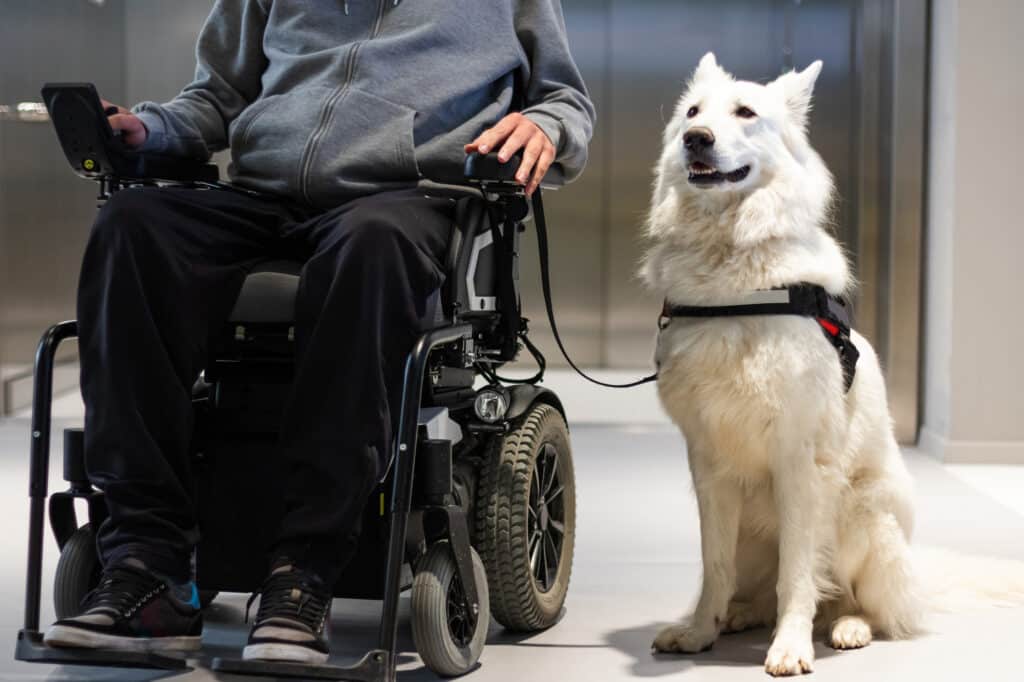
Traumatic Brain Injury (TBI) is a debilitating condition that affects millions of individuals worldwide. It occurs when an external force disrupts the normal function of the brain, leading to various physical, cognitive, and emotional impairments. The recovery process from TBI can be lengthy and challenging, requiring extensive therapy and support. In recent years, TBI service dogs have emerged as valuable partners in this journey, offering numerous benefits to individuals with TBI. In this article, we will explore the ways in which TBI service dogs contribute to the recovery process and enhance the overall quality of life for people living with TBI.
What are TBI Service Dogs?
TBI service dogs, also known as TBI assistance dogs, are specially trained canines that offer support and assistance to individuals with traumatic brain injuries. These special service dogs are trained to perform a wide range of tasks tailored to the unique needs of each individual, providing both physical and emotional assistance. The selection and training of TBI service dogs are typically carried out by organizations specializing in service dog training. These organizations employ certified trainers who use positive reinforcement methods to shape the dogs’ behavior and train them to perform specific tasks.
Physical Assistance
1. Balance and Mobility Support
Many individuals with TBI experience difficulties with balance, coordination, and mobility. TBI service dogs are trained to assist in such situations by providing balance support. They are trained to act as a counterbalance by applying pressure against the person’s body, thus preventing falls and improving stability. These dogs can also retrieve items and assist with mobility aids such as walkers or wheelchairs.
2. Emergency Assistance
TBI service dogs are trained to recognize signs of distress or danger and respond accordingly. They can be taught to activate emergency alert systems, fetch medications or emergency supplies, and even bark for help if their handler is in immediate danger. These dogs provide an invaluable sense of security, particularly for individuals who live alone or have limited support systems.
3. Retrieval and Assistance Tasks
TBI service dogs can be trained to pick up and retrieve items, eliminating the need for individuals to bend down or exert themselves unnecessarily. This is helpful for individuals with mobility limitations or when an object is out of reach. Additionally, dogs can be trained to help with a few simple tasks, such as opening doors, turning light switches on/off, or alerting their handler to specific sounds or alarms.
Cognitive Assistance
1. Memory and Organization Skills
Cognitive impairments, such as memory loss, difficulty with organization, and poor attention span, are common challenges faced by individuals with TBI. TBI service dogs can aid in these areas by providing reminders and cues. They can be trained to retrieve specific items when prompted or nudge their handler when it’s time to take medication or perform a task. The constant presence of the dog can also serve as a grounding element, reducing anxiety and helping the individual stay focused.
2. Sensory Support
A significant number of individuals with TBI also experience sensory processing difficulties. TBI service dogs can be trained to provide sensory support by acting as a buffer between their handler and overwhelming stimuli. They can be taught to create personal space in crowded environments, provide deep pressure therapy to calm anxiety or alert their handler to the presence of certain smells or sounds. By doing so, these dogs help individuals with TBI navigate sensory-rich environments with greater ease.
Emotional Assistance
1. Companionship and Emotional Support
Living with TBI can be isolating and emotionally challenging. TBI service dogs provide constant companionship and emotional support, which can greatly alleviate feelings of loneliness and frustration. These dogs offer a non-judgmental presence, providing comfort and unconditional love during the recovery journey. The emotional bond formed between the individual and their service dog also acts as a motivator, encouraging engagement in therapy and promoting overall well-being.
2. Stress and Anxiety Reduction
TBI service dogs are trained to detect signs of stress and anxiety in their handlers and respond with comforting behaviors. They can provide deep pressure therapy by leaning against their handler, offering a calming weight and reducing anxiety levels. Through their presence and affectionate nature, these dogs provide a natural source of stress relief, contributing to a more relaxed and positive state of mind.
Enhancing Social Skills and Community Integration
Living with TBI often presents challenges in socializing and community integration. TBI service dogs can facilitate social interactions by acting as a conversation starter and icebreaker. These dogs attract attention, and people are often curious to learn more about the dog’s role and the individual’s experiences. This increased social interaction leads to greater community engagement and helps individuals with TBI rebuild their social skills and support networks.
Benefits and Success Stories
The use of TBI service dogs has proven to have significant benefits for individuals with traumatic brain injuries. Numerous success stories demonstrate the positive impact these dogs have on the recovery process and quality of life. One such example involves Marcus, a young athlete who suffered a severe TBI during a sports accident. Through the assistance of a TBI service dog named Luna, Marcus regained his confidence and independence. Luna provided balance and mobility support, helped with daily tasks, and even accompanied Marcus during his therapy sessions, motivating him to push through the challenges.
TBI service dogs have become invaluable allies in the recovery process for individuals with traumatic brain injuries. Their physical, cognitive, and emotional support significantly enhances the quality of life for those affected by TBI. Through their extensive training, these dogs provide assistance with everyday tasks, promote cognitive functioning, reduce stress and anxiety, and facilitate community integration. The companionship and unwavering presence of a service dog can truly make a difference in the recovery journey, empowering individuals with TBI to regain independence, rebuild their lives, and face the future with renewed hope.



